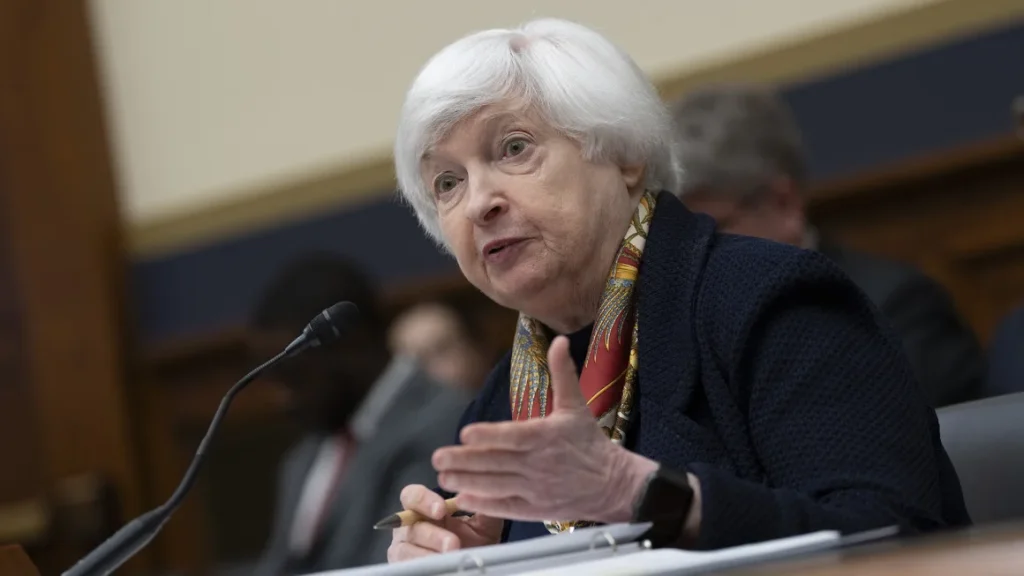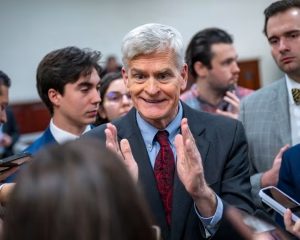Yellen warns that sweeping tariffs are ‘deeply misguided’ in swipe at Trump

Treasury Secretary Janet Yellen warned on Thursday that “deeply misguided” proposals for sweeping tariffs would ramp up inflation and hurt American businesses, offering a clear critique of former President Donald Trump’s economic policy.
The warning, delivered during a speech at the Council on Foreign Relations in New York City, comes as economic issues remain a top concern for voters with the election just under three weeks away. Trump has made his call for steep tariffs a key piece of his policy agenda, while Vice President Kamala Harris has warned his tariff plans would raises prices for American families, referring to it as a “Trump tax.”
Yellen, who typically refrains from wading into politics and did not mention Trump by name in her speech, argued against across-the-board tariffs and a “go it alone” strategy on the global stage.
“Calls for walling America off with high tariffs on friends and competitors alike or by treating even our closest allies as transactional partners are deeply misguided,” Yellen said. “Sweeping, untargeted tariffs would raise prices for American families and make our businesses less competitive.”
“And we cannot even hope to advance our economic and security interests — such as opposing Russia’s illegal invasion of Ukraine — if we go it alone,” she said. “But the issues we face today, from broken supply chains, to climate change and global pandemic preparedness, to China’s industrial overcapacity, also mean we cannot simply draw from an old playbook.”
Still, in a question-and-answer session following her remarks, Yellen defended the Biden administration’s decision not to repeal Trump-era tariffs on China, telling the moderator, “I think the main reason for that is that we look to China to address the practices that were emphasized in the [Section] 301 action, which went to issues of unfair competition, and China really did not address any of those issues.”
“Until China made a meaningful attempt to respond to the 301 unfair trade practices, President Biden felt we should not – we should not reward China by lowering the tariffs,” she added.
Trump implemented sweeping tariffs on about $300 billion of Chinese-made products while in office. The Biden administration later kept those tariffs in place and in some cases expanded upon them.
Trump has said that, if elected, he would impose tariffs of up to 20% on every foreign import coming into the US as well as another tariff upward of 60% on all Chinese imports. He’s also said he would implement a “100% tariff” on countries that shift away from using the US dollar.
“To me, the most beautiful word in the dictionary is tariff,” Trump said at the Economic Club of Chicago on Tuesday.
Trump defended his calls for tariffs when pressed about the negative impacts by Bloomberg News Editor-in-Chief John Micklethwait, who said it was “just simple mathematics” that the tariffs would pass on higher costs to American consumers.
“Number one, it’s for the protection that we have here and the new companies that will move in because we’re going to have thousand of companies moving into this country,” said Trump, who argued tariffs would have a “positive, not a negative” effect on the economy.
Yellen also offered a more direct swipe at a pledge from Republicans to extend Trump-era tax cuts during the question-and-answer session.
“I believe it’s important for our nation to have a responsible fiscal policy and to be on a sustainable fiscal path, and some of the proposals that have been put forward on the Republican side—and I should say I’m covered by the Hatch Act and want to be careful not to comment on electoral politics,” she acknowledged. “But, for example, the [Congressional Budget Office] has said that [extending tax cuts] would result in $5 trillion of additional deficits over the next 10 years, and I believe, unless that’s paid for in some way, that’s something that we just can’t afford.”


